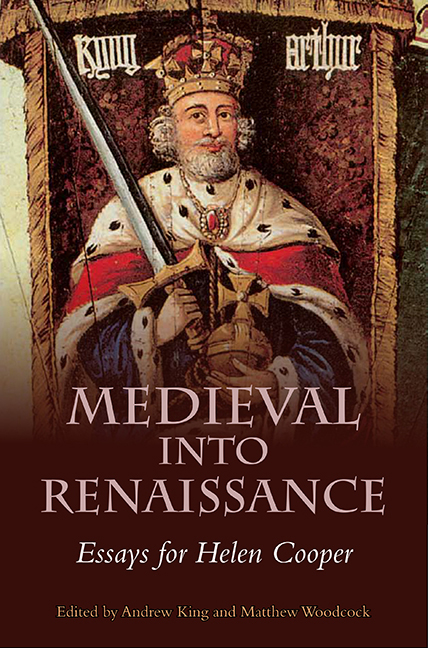Book contents
- Frontmatter
- Contents
- List of Illustrations
- List of Contributors
- Acknowledgments
- Abbreviations
- Introduction
- Unknowe, unkow, Vncovthe, uncouth: From Chaucer and Gower to Spenser and Milton
- Armour that doesn't work: An Anti-meme in Medieval and Renaissance Romance
- ‘Of his ffader spak he no thing’: Family Resemblance and Anxiety of Influence in Fifteenth-Century Prose Romance
- Writing Westwards: Medieval English Romances and their Early Modern Irish Audiences
- Penitential Romance after the Reformation
- The English Laureate in Time: John Skelton's Garland of Laurel
- Thomas Churchyard and the Medieval Complaint Tradition
- Placing Arcadia
- Fathers, Sons and Surrogates: Fatherly Advice in Hamlet
- ‘To visit the sick court’: Misogyny as Disease in Swetnam the Woman-Hater
- The Monument of Uncertainty: Sovereign and Literary Authority in Samuel Sheppard's The Faerie King
- Mopsa's Arcadia: Choice Flowers Gathered out of Sir Philip Sidney's Rare Garden into Eighteenth-Century Chapbooks
- Bibliography
- Index
- A Bibliography of Helen Cooper's Published Works
- Tabula Gratulatoria
Introduction
Published online by Cambridge University Press: 05 July 2016
- Frontmatter
- Contents
- List of Illustrations
- List of Contributors
- Acknowledgments
- Abbreviations
- Introduction
- Unknowe, unkow, Vncovthe, uncouth: From Chaucer and Gower to Spenser and Milton
- Armour that doesn't work: An Anti-meme in Medieval and Renaissance Romance
- ‘Of his ffader spak he no thing’: Family Resemblance and Anxiety of Influence in Fifteenth-Century Prose Romance
- Writing Westwards: Medieval English Romances and their Early Modern Irish Audiences
- Penitential Romance after the Reformation
- The English Laureate in Time: John Skelton's Garland of Laurel
- Thomas Churchyard and the Medieval Complaint Tradition
- Placing Arcadia
- Fathers, Sons and Surrogates: Fatherly Advice in Hamlet
- ‘To visit the sick court’: Misogyny as Disease in Swetnam the Woman-Hater
- The Monument of Uncertainty: Sovereign and Literary Authority in Samuel Sheppard's The Faerie King
- Mopsa's Arcadia: Choice Flowers Gathered out of Sir Philip Sidney's Rare Garden into Eighteenth-Century Chapbooks
- Bibliography
- Index
- A Bibliography of Helen Cooper's Published Works
- Tabula Gratulatoria
Summary
The reign of Henry VII marks the end of the Middle Ages. These were succeeded by an age of daring discoveries, such as when Caprornicus observed the Moon while searching the skies with a telescope, thus causing the rotation of the Earth, crops, etc. […] The greatest of these discoverers, however, was St Christopher Columba, the utterly memorable American, who, with the assistance of the intrepid adventurers John and Sebastian Robot, discovered how to make an egg stand on its wrong end. (Modern History is generally dated from this event.)
Sic. The more glaringly erroneous and nonsensical claims made about the transition between the medieval and Renaissance periods in W.C. Sellar's and R.J. Yeatman's pithy, parodic 1066 and All That: A Memorable History of England (1930) are sandwiched between more coherent bold pronouncements of a sort that commonly elicit expressions of scepticism, scorn or caution from scholars of English literature produced before 1600. That is to say, the claim that the Middle Ages ended in 1485, and the implied suggestion that Tudor history and the discovery of the Americas are essentially ‘modern’ – if only early modern – stories, are troublesome in a different way. As Helen Cooper makes plain, ‘the people of England did not wake up the day after the Battle of Bosworth, which saw the end of the long-ruling Plantagenets and the establishment of the parvenu Tudors, to find themselves in a new and modern world’. Moreover, we would need to propose another set of working dates were we to be writing of the advent of the Renaissance in, say, Italy, Scotland or Eastern Europe, or if we were considering disciplines other than literature. Histories of the Renaissance in ‘natural philosophy’ and scientific enquiry, for example, usually begin by discussing the publication of works by Nicholas Copernicus (‘Caprornicus’) and Andreas Vesalius during the 1540s and then concentrate on later sixteenth – and seventeenth-century sources. There is, however, a certain admirable simplicity to the kind of boldness and cleanness of line exhibited, albeit in an exaggerated form, in that opening quotation. These are the kind of certainties to which a freshman student of literary history might cling, and that a sympathetic instructor might grudgingly concede are useful starting points for further, more nuanced exposition and enquiry. C.S. Lewis maintained that ‘though “periods” are a mischievous conception they are a methodological necessity’.
- Type
- Chapter
- Information
- Medieval into RenaissanceEssays for Helen Cooper, pp. 1 - 14Publisher: Boydell & BrewerPrint publication year: 2016



